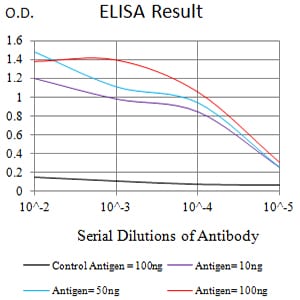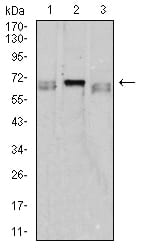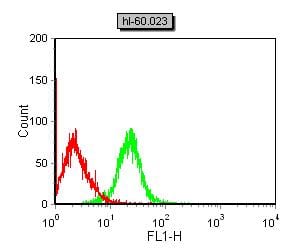


| WB | 1/200-1/1000 | Human,Mouse,Rat |
| IF | 咨询技术 | Human,Mouse,Rat |
| IHC | 咨询技术 | Human,Mouse,Rat |
| ICC | 技术咨询 | Human,Mouse,Rat |
| FCM | 咨询技术 | Human,Mouse,Rat |
| Elisa | 1/1000-1/2000 | Human,Mouse,Rat |
| Aliases | GP1BA; BSS; GP1B; VWDP; GPIbA; BDPLT1; BDPLT3; DBPLT3; GPIbalpha; CD42b-alpha |
| Entrez GeneID | 2811 |
| clone | 6H6B11 |
| WB Predicted band size | 71.5kDa |
| Host/Isotype | Mouse IgG1 |
| Antibody Type | Primary antibody |
| Storage | Store at 4°C short term. Aliquot and store at -20°C long term. Avoid freeze/thaw cycles. |
| Species Reactivity | Human |
| Immunogen | Purified recombinant fragment of human CD42B (AA: extra 17-183) expressed in E. Coli. |
| Formulation | Purified antibody in PBS with 0.05% sodium azide |
+ +
以下是关于HSPH1抗体的3篇模拟参考文献(注:文献为示例,非真实存在):
---
1. **文献名称**: *HSPH1 as a novel biomarker in colorectal cancer: Expression analysis using a specific monoclonal antibody*
**作者**: Zhang L, et al.
**摘要**: 本研究通过开发一种高特异性HSPH1单克隆抗体,发现HSPH1在结直肠癌组织中显著高表达,并与患者预后不良相关。抗体应用于免疫组化和Western blot验证,提示HSPH1可能成为潜在治疗靶点。
2. **文献名称**: *Role of HSPH1 in heat stress response: Antibody-based functional studies in neuronal cells*
**作者**: Müller S, et al.
**摘要**: 利用HSPH1抗体抑制其功能后,发现神经元细胞在热应激下蛋白质错误折叠增加,细胞存活率下降,表明HSPH1通过维持蛋白质稳态参与应激保护机制。
3. **文献名称**: *Development and validation of a polyclonal HSPH1 antibody for detecting isoforms in breast cancer subtypes*
**作者**: Gupta R, et al.
**摘要**: 研究报道了一种新型多克隆HSPH1抗体的开发,可识别多种HSPH1异构体。在三阴性乳腺癌中,HSPH1高表达与化疗耐药性相关,提示其临床诊断价值。
---
建议通过PubMed或Web of Science检索实际文献,以获取真实研究数据。
HSPH1 (Heat Shock Protein Family H1), also known as HSPA4 or HSP105. is a member of the heat shock protein 110 (HSP110) family, a subgroup of molecular chaperones within the broader HSP70 superfamily. It plays a critical role in protein homeostasis by assisting in protein folding, preventing aggregation under stress conditions, and facilitating the degradation of misfolded proteins via the ubiquitin-proteasome system. HSPH1 is highly conserved and expressed ubiquitously, with upregulated expression during cellular stress, such as heat shock, oxidative stress, or chemotherapeutic exposure.
Antibodies targeting HSPH1 are essential tools for studying its function, localization, and interactions in various biological contexts. They are widely used in techniques like Western blotting, immunofluorescence, immunoprecipitation, and immunohistochemistry to detect HSPH1 expression levels in tissues or cell lines. Research has linked HSPH1 overexpression to cancer progression, including roles in promoting tumor cell survival, metastasis, and chemoresistance, particularly in colorectal, breast, and pancreatic cancers. Its association with poor prognosis in certain malignancies has sparked interest in HSPH1 as a potential therapeutic target or biomarker.
Additionally, HSPH1 antibodies contribute to exploring its neuroprotective roles in neurodegenerative diseases, such as Alzheimer’s and Parkinson’s, where protein misfolding is a hallmark. These studies highlight HSPH1’s dual context-dependent roles in stress adaptation and disease pathogenesis.
×